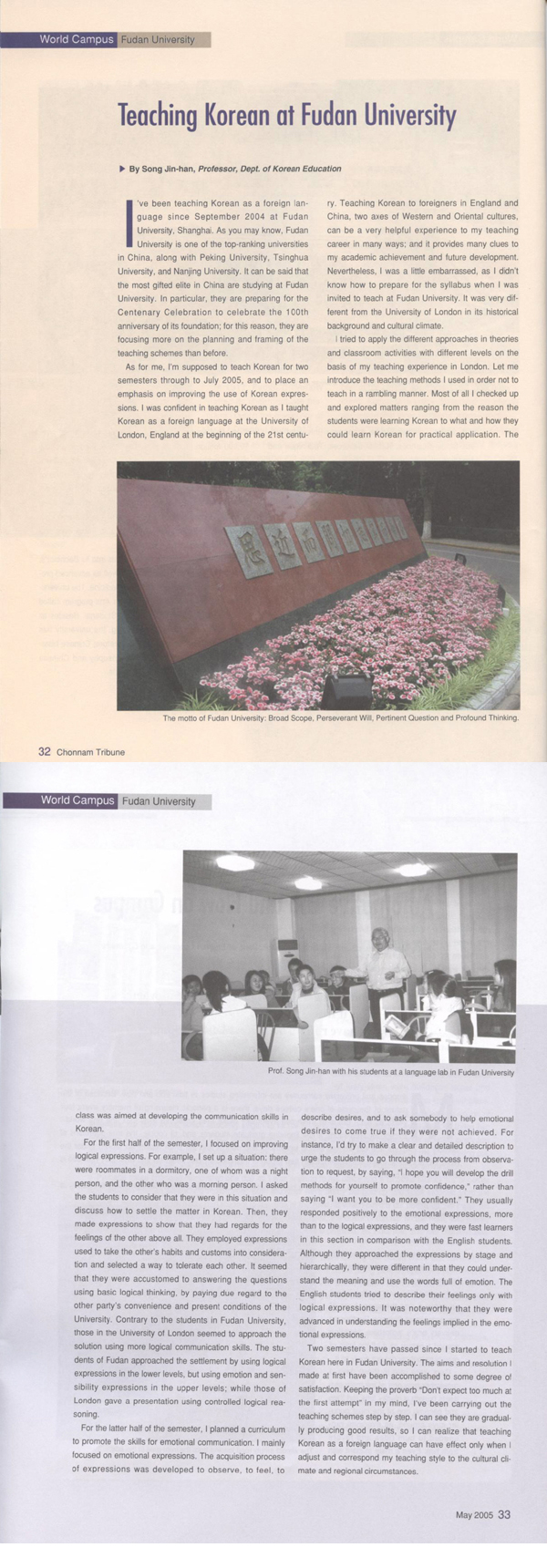푸단대학교

Teaching Korean at Fudan University
I’ve been teaching Korean as a foreign language since September 2004 at Fudan University, Shanghai. As you may know, Fudan University is one of the top-ranking universities in China, along with Peking University, Tsinghua University, and Nanjing University. It can be said that the most gifted elite in China are studying at Fudan University. In particular, they are preparing for the Centenary Celebration to celebrate the 100th anniversary of its foundation; for this reason, they are focusing more on the planning and framing of the teaching schemes than before.
As for me, I’m supposed to teach Korean for two semesters through to July 2005, and to place an emphasis on improving the use of Korean expressions. I was confident in teaching Korean as I taught Korean as a foreign language at the University of London, England at the beginning of the 21st century. Teaching Korean to foreigners in England and China, two axes of Western and Oriental cultures, can be a very helpful experience to my teaching career in many ways; and it provides many clues to my academic achievement and future development. Nevertheless, I was a little embarrassed, as I didn’t know how to prepare for the syllabus when I was invited to teach at Fudan University. It was very different from the University of London in its historical background and cultural climate.
I tried to apply the different approaches in theories and classroom activities with different levels on the basis of my teaching experience in London. Let me introduce the teaching methods I used in order not to teach in a rambling manner. Most of all I checked up and explored matters ranging from the reason the students were learning Korean to what and how they could learn Korean for practical application. The class was aimed at developing the communication skills in Korean.
For the first half of the semester, I focused on improving logical expressions. For example, I set up a situation: there were roommates in a dormitory, one of whom was a night person, and the other who was a morning person. I asked the students to consider that they were in this situation and discuss how to settle the matter in Korean. Then, they made expressions to show that they had regards for the feelings of the other above all. They employed expressions used to take the other’s habits and customs into consideration and selected a way to tolerate each other. It seemed that they were accustomed to answering the questions using basic logical thinking, by paying due regard to the other party’s convenience and present conditions of the University. Contrary to the students in Fudan University, those in the University of London seemed to approach the solution using more logical communication skills. The students of Fudan approached the settlement by using logical expressions in the lower levels, but using emotion and sensibility expressions in the upper levels; while those of London gave a presentation using controlled logical reasoning.
For the latter half of the semester, I planned a curriculum to promote the skills for emotional communication. I mainly focused on emotional expressions. The acquisition process of expressions was developed to observe, to feel, to describe desires, and to ask somebody to help emotional desires to come true if they were not achieved. For instance, I’d try to make a clear and detailed description to urge the students to go through the process from observation to request, by saying, “I hope you will develop the drill methods for yourself to promote confidence,” rather than saying “I want you to be more confident.” They usually responded positively to the emotional expressions, more than to the logical expressions, and they were fast learners in this section in comparison with the English students. Although they approached the expressions by stage and hierarchically, they were different in that they could understand the meaning and use the words full of emotion. The English students tried to describe their feelings only with logical expressions. It was noteworthy that they were advanced in understanding the feelings implied in the emotional expressions.
Two semesters have passed since I started to teach Korean here in Fudan University. The aims and resolution I made at first have been accomplished to some degree of satisfaction. Keeping the proverb “Don’t expect too much at the first attempt” in my mind, I’ve been carrying out the teaching schemes step by step. I can see they are gradually producing good results, so I can realize that teaching Korean as a foreign language can have effect only when I adjust and correspond my teaching style to the cultural climate and regional circumstances.

